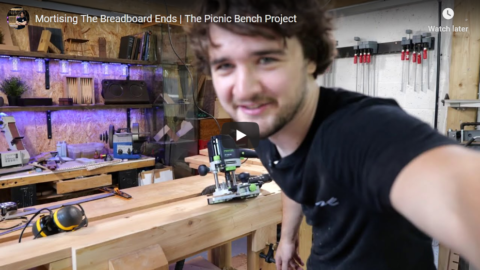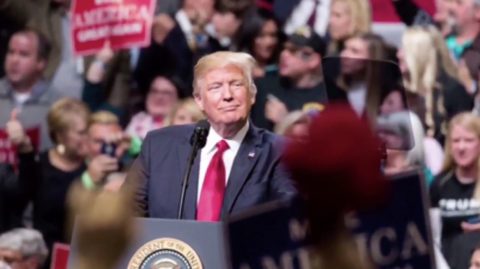Matt Estlea
Published 27 Jul 2020Mortising The Breadboard Ends | The Picnic Bench Project
In this video, I begin mortising the breadboard ends for the tabletop and also go on the hunt for some extraction accessories. 👀
► Buy the Ridge Wallet here: https://www.ridge.com/ESTLEA
Use the Promo Code ‘ESTLEA’ to claim your 10% off!
_________________________________________________________________
Support what I do by becoming a Patron! This will help fund new tools, equipment and cover my overheads. Meaning I can continue to bring you regular, high quality, free content. Thank you so much for your support! https://www.patreon.com/mattestlea
Don’t want to commit to a monthly direct debit but still want to help out? That’s fine!
You can make a one time donation here: www.mattestlea.com/donate
You can donate us biscuits here: www.mattestlea.com/wishlist
_________________________________________________________________
BUY THE WOODWORKING BIBLE HERE:
www.mattestlea.com/the-woodworkers-manual
_________________________________________________________________SOCIAL MEDIA
Instagram: www.instagram.com/mattestlea
Twitter: www.twitter.com/mattestlea
Patreon: www.patreon.com/mattestlea
Pinterest: www.pinterest.com/mattestlea
LinkedIn: www.linkedin.com/in/matt-estlea-b6414b11a/
_________________________________________________________________
See what tools I use here: www.mattestlea.com/equipment
My Website: www.mattestlea.com
_________________________________________________________________My name is Matt Estlea, I’m a 24 year old Woodworker from Basingstoke in England and my aim is to make your woodworking less s***.
I come from 5 years tuition at Rycotewood Furniture Centre with a further 1 year working as an Artist in Residence at the Sylva Foundation. I now teach City and Guilds Furniture Making at Rycotewood as of September 2018.
If you’re interested in studying at Rycotewood, view their courses here:
www.mattestlea.com/rycotewoodI also had 5 years of experience working at Axminster Tools and Machinery where I helped customers with purchasing tools, demonstrated in stores and events, and gained extensive knowledge about a variety of tools and brands. I discontinued this at the start of 2019 to focus solely on video creation and teaching.
During the week, I film woodworking projects, tutorials, reviews and a viewer favourite ‘Tool Duel’ where I compare two competitive manufacturers tools against one another to find out which is best. I also have a Free Online Woodworking School which you should definitely check out!
www.mattestlea.com/school
I like to have a laugh and my videos are quite fast paced BUT you will learn a lot, I assure you.
Lets go make a mess.
July 28, 2020
Mortising The Breadboard Ends | The Picnic Bench Project
How Matt Ridley stopped being an “Enviro-Pessimist”
It was human ingenuity that did it for him:

Spiti Valley in the Great Himalayan National Park. (The little blue speck in the middle of the photo is a truck, for scale.)
Photo by Sudhanshu Gupta via Wikimedia Commons.
If you had asked me in 1980 to predict what would happen to that bird and its forest ecosystem, I would have been very pessimistic. I could see the effect on the forests of growing human populations, with their guns and flocks of sheep. More generally, I was marinated in gloom by almost everything I read about the environment. The human population explosion was unstoppable; billions were going to die of famine; malaria and other diseases were going to increase; oil, gas, and metals would soon run out, forcing us to return to burning wood; most forests would then be felled; deserts were expanding; half of all species were heading for extinction; the great whales would soon be gone from the oil-stained oceans; sprawling cities and modern farms were going to swallow up the last wild places; and pollution of the air, rivers, sea, and earth was beginning to threaten a planetary ecological breakdown. I don’t remember reading anything remotely optimistic about the future of the planet.
Today, the valleys we worked in are part of the Great Himalayan National Park, a protected area that gained prestigious World Heritage status in 2014. The logo of the park is an image of the western tragopan, a bird you can now go on a trekking holiday specifically to watch. It has not gone extinct, and although it is still rare and hard to spot, the latest population estimate is considerably higher than anybody expected back then. The area remains mostly a wilderness accessible largely on foot, and the forests and alpine meadows have partly recovered from too much grazing, hunting, and logging. Ecotourism is flourishing.
This is just one small example of things going right in the environment. Let me give some bigger ones. Far from starving, the seven billion people who now inhabit the planet are far better fed than the four billion of 1980. Famine has pretty much gone extinct in recent decades. In the 1960s, about two million people died of famine; in the decade that just ended, tens of thousands died — and those were in countries run by callous tyrants. Paul Ehrlich, the ecologist and best-selling author who declared in 1968 that “[t]he battle to feed all of humanity is over” and forecast that “hundreds of millions of people will starve to death” — and was given a genius award for it — proved to be very badly wrong.
Remarkably, this feeding of seven billion people has happened without taking much new land under the plow and the cow. Instead, in many places farmland has reverted to wilderness. In 2009, Jesse Ausubel of Rockefeller University calculated that thanks to more farmers getting access to better fertilizers, pesticides, and biotechnology, the area of land needed to produce a given quantity of food — averaged for all crops — was 65 percent less than in 1961. As a result, an area the size of India will be freed up by mid-century. That is an enormous boost for wildlife. National parks and other protected areas have expanded steadily as well.
Nor have these agricultural improvements on the whole brought new problems of pollution in their wake. Quite the reverse. The replacement of pesticides like DDT with much less harmful ones that do not persist in the environment and accumulate up the food chain, in addition to advances in biotechnology, has allowed wildlife to begin to recover. In the part of northern England where I live, otters have returned to the rivers, and hawks, kites, ospreys, and falcons to the skies, largely thanks to the elimination of organochlorine pesticides. Where genetically modified crops are grown — not in the European Union — there has been a 37 percent reduction in the use of insecticides, as shown by a recent study done at Gottingen University.
One of the extraordinary features of the past 40 years has been the reappearance of wildlife that was once seemingly headed for extinction. Bald eagles have bounced back so spectacularly that they have been taken off the endangered list. Deer and beavers have spread into the suburbs of cities, followed by coyotes, bears, and even wolves. The wolf has now recolonized much of Germany, France, and even parts of the heavily populated Netherlands. Estuaries have been cleaned up so that fish and birds have recolonized rivers like the Thames.
Roman kit: featuring armour, swords, spears, artillery, rations, deckchairs, and of course shoes
Lindybeige
Published 27 Jul 2020Go to https://expressvpn.com/lindybeige and find out how you can get three months free.
A video of re-enactors and their Roman kit. Sorry about the wind noise.
Support me on Patreon: https://www.patreon.com/Lindybeige
Here’s a link to the Ermine Street Guard – Britain’s foremost imperial Roman re-enactment group: http://www.erminestreetguard.co.uk
Was your re-enactment group featured? Ask for a link here!
Buy the music – the music played at the end of my videos is now available here: https://lindybeige.bandcamp.com/track…
Buy tat (merch):
https://outloudmerch.com/collections/…Lindybeige: a channel of archaeology, ancient and medieval warfare, rants, swing dance, travelogues, evolution, and whatever else occurs to me to make.
▼ Follow me…
Twitter: https://twitter.com/Lindybeige I may have some drivel to contribute to the Twittersphere, plus you get notice of uploads.
My website:
http://www.LloydianAspects.co.uk
Tank Chats #76 Tetrarch Tank | The Tank Museum
The Tank Museum
Published 31 May 2019Tetrarch tanks were flown over on D-Day, 6th June, 1944, for the invasion of France during WW2. Find out more with David Fletcher.
Originally adopted by the British Army as a light tank it became the first British airborne tank.
Many thanks to Vitaly Kuzmin for providing the image of the Tetrarch at Kubinka https://www.vitalykuzmin.netSupport the work of The Tank Museum on Patreon: ► https://www.patreon.com/tankmuseum
Visit The Tank Museum SHOP: ► https://tankmuseumshop.org/
Twitter: ► https://twitter.com/TankMuseum
Tiger Tank Blog: ► http://blog.tiger-tank.com/
Tank 100 First World War Centenary Blog: ► http://tank100.com/ #tankmuseum #tanks #DDay75 #tankchats
QotD: Incentives and opportunity costs
The first and most important thing in all economics is that incentives matter. If you can grasp that and also get to grips with the second, that there are always opportunity costs, then you’re going to be doing better than 90% of the economics profession itself. But do remember that incentives matter, incentives really, really, matter. Changes in tax law have stopped people from dying for example.
No, really, there was one of those natural experiments, when inheritance tax laws changed at the end of the year. There was a definite blip downwards in the death rate of people rich enough to pay inheritance tax at the end of the year, a corresponding one upwards again as the new, lower, rates came into effect in January. Incentives really, really, matter.
Tim Worstall, “What’s The Over And Under On Tesla’s 200,000th Car Being Delivered On July 1?”, Continental Telegraph, 2019-05-03.







